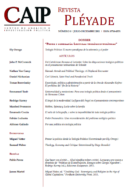
Publicado 2021-07-13
Palabras clave
- Hannah Arendt,
- Weimar political theology,
- secularism,
- Martin Heidegger,
- technology
Cómo citar

Esta obra está bajo una licencia internacional Creative Commons Atribución-NoComercial 4.0.
Resumen
Despite the recent revival of interest in Weimar political theology to rethink the relationship between religion and politics, one name is hardly ever mentioned in these debates: Hannah Arendt. Arendt’s apparent silence on this issue is peculiar because not only did she intellectually mature in the Weimar context and did she personally know many of the protagonists of the Weimar political theology debate, but also and especially because Carl Schmitt’s famous thesis that all political concepts are in reality secularized theological concepts is obviously diametrically opposed to Arendt’s idea of a self-contained politics. This paper argues that the reason why Arendt did not intervene directly in this debate is that she was mainly concerned with deconstructing the more encompassing claim that politics requires a force external to it, the origins of which she traces back to Plato’s attempt to transform political action into a mode of fabrication. It will be shown that the main target of Arendt’s political thought is therefore not political theology, but what we could tentatively call “political technology.”